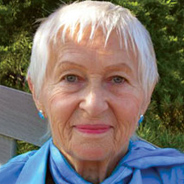John and I grew up across the street from one another on the upper Westside of Manhattan. We actually met and discovered this slimmest of connections one evening in 1981, when we were both back in our old neighborhoods for a small conference on the environment (John was a presenter), and found ourselves seated next to one another at a dinner in the undercroft of the Synod House on the grounds of the Cathedral of St. John the Divine. When I mentioned that I had grown up on the Cathedral grounds, my father having been the headmaster of the Choir School, he gave me an intense, fiery look. “My best friend went off to that school; he disappeared through those iron gates and I never saw him again!” Clearly the nine year old John was still carrying strong feelings about that long ago unexpected separation—his first “abduction” experience.
In no time John was telling me about his latest initiative (in conjunction with other colleagues) to awaken the peoples of the world to the catastrophic consequences of psychic numbing that had deadened us to the perils of nuclear proliferation. He was an early member of the International Physicians for the Prevention of Nuclear War, the group that four years later, in 1985, was awarded the Nobel Peace Prize.
In April of 1997, John and I reconnected when he spoke to a sold-out FIONS audience of over 200 people about his work with “experiencers”—people who had encountered extraterrestrial beings. He brought one with him, Karin, a young waitress in a modest Boston restaurant, and invited her to address the gathering. Though this was her first exposure to public speaking, she held her audience spellbound as she described her ongoing encounters with ETs and her great affection for them, once she had moved through her initial terror.
With typical modesty, John ends his second book about the extraterrestrial phenomenon, Passport to the Cosmos, with a quote from Karin’s remarks on that memorable evening. John was never afraid to step boldly into exploring uncharted waters, but he then would step modestly to one side and give the spotlight to others as he remained in the background, always intently and compassionately watching, listening, energetically holding the space for others.
FIONS was fortunate to have had John Mack as a guest speaker on several occasions. His remarks during the Reich Symposium at the Academy of Medicine, in November of ‘97, were riveting. When I listened to the tape recording of that talk recently, shortly after hearing of his death, I was struck by how his insights then were sharpened and continued in his last bit of writing — an editorial he had sent in late September to the Boston Globe — before heading off for London to deliver a paper on one of his favorite subjects, Lawrence of Arabia. John never ceased to recognize and warn us of the ways in which fear distorts our relationships to self and other. In the last paragraph of the Globe piece he writes, “The misuse of fear to control our minds should become a central focus of our national consciousness, and students at every level of our educational system need to be taught to recognize the signs of this corrosive stratagem. Only in this way, I believe, will we be able to preserve our national values and integrity, and make the intelligent choices upon which genuine security and fulfillment depend.”
When I first read the last chapter of Passport to the Cosmos, I thought my heart would burst. Quite simply, it’s a brilliant, passionate plea for human beings everywhere to begin to embrace a new and expanded cosmology, one that transcends the penetrating fears that fiercely grip us and hold us captive.
In the end, the abduction phenomenon seems to me to be a part of the shift in consciousness that is collapsing duality and enabling us to see that we are connected beyond the Earth at a cosmic level. No common enemy will unite us, but the realization of a common Source might. [1]
Tributes to John have been pouring in to the John E. Mack Institute in Cambridge, MA from around the world ever since his death became known. People have written from their hearts trying to capture the meaning of John in their lives. Who was this man and why do I love him so?—their simple and beautifully crafted eulogies seem to be asking.
I see a nine year-old boy standing tip toe on a four-legged rough-hewn stool, peering intently and curiously into the future. Into each leg of the stool is carved a single word: INTELLIGENCE, COURAGE, HUMILITY, COMPASSION.
Thank you, John, for opening the door and inviting us to cross the threshold.
Jane Hughes Gignoux
October 23, 2004
[1] Mack, John E., MD, Passport to the Cosmos, Crown Publishers, New York, 1999, p. 280.
-
 Jane Hughes Gignoux, a native New Yorker, is author of Some Folk Say: Stories of Life, Death and Beyond. She is past president and board member of Friends of the Institute of Noetic Sciences (FIONS), whose mission is “to explore our growing awareness of consciousness and emerging spirituality in shared inquiry, furthering individual wholeness and global vision”, is a cofounder of the Coalition for OneVoice, and an active member of the Undoing Racism Alliance.
Jane Hughes Gignoux, a native New Yorker, is author of Some Folk Say: Stories of Life, Death and Beyond. She is past president and board member of Friends of the Institute of Noetic Sciences (FIONS), whose mission is “to explore our growing awareness of consciousness and emerging spirituality in shared inquiry, furthering individual wholeness and global vision”, is a cofounder of the Coalition for OneVoice, and an active member of the Undoing Racism Alliance.
© 2004 Jane Hughes Gignoux